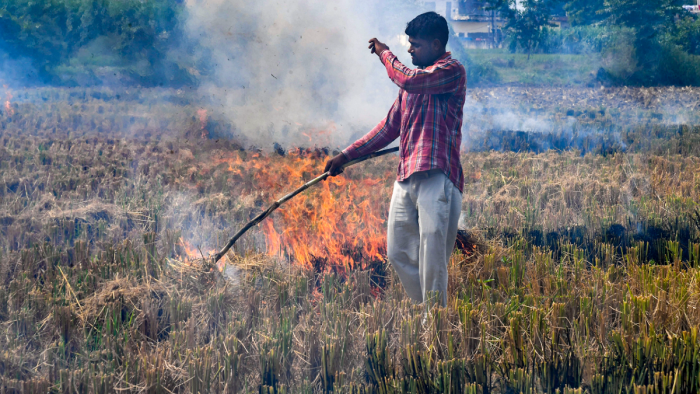Air pollution is a worldwide and growing problem. The particles that makeup air pollution can be emitted both naturally and by human activity. These particles can harm the environment, human health, property, and other living things. In India, farmers often use fire for agricultural practices such as clearing fields for planting. This is called stubble burning. If you are interested in learning how to prevent air pollution: Stubble Burning.
What is stubble burning?
Stubble burning is the process of burning agricultural waste, such as straw, crop residue, or animal manure. It is a common practice in many parts of the world, particularly in India and China. Stubble burning releases harmful pollutants into the air, including particulate matter, carbon monoxide, nitrogen oxides, and sulphur dioxide. These pollutants can cause a range of health problems, including respiratory illness, heart disease, and cancer. They can also contribute to climate change.

How to prevent air pollution??
There are various ways to prevent air pollution caused by stubble burning. One way is to use mechanical means of removing the residue, such as a combine harvester. This method is, however, not very feasible in India due to the high cost of machinery and lack of infrastructure.
Another way is to use Biomass Pelletization plants which convert the crop residue into pellets that can be used as fuel. This is a more sustainable and environment-friendly option as it doesn’t release any harmful gases into the atmosphere.
The government has also introduced a scheme called ‘Pradhan Mantri Fasal Bima Yojana’ which provides insurance cover for farmers in case of crop loss due to natural calamities. This will help farmers financially and will reduce their dependency on stubble burning.
stubble burning can also be prevented by creating awareness among farmers about its harmful effects on health and the environment. The government should run campaigns and workshops to educate farmers about alternative methods of dealing with crop residue.
Causes of air pollution
One of the major causes of air pollution is stubble burning. Every year, farmers in India burn their crop residue on their fields to clear them for the next season. This practice releases harmful chemicals and particulates into the air, which can cause respiratory problems, eye irritation, and other health problems.
Air pollution is a growing problem in the world today. There are many causes of air pollution, but the most common and damaging ones are automobiles, factories, and power plants.
Automobiles release harmful gases into the air, including carbon dioxide and nitrogen oxides. These gases contribute to global warming and also create smog, which can cause respiratory problems in people.
Factories emit a variety of pollutants, including particulate matter, sulfur dioxide, and carbon monoxide. These pollutants can damage the environment and human health.
Power plants burn fossil fuels such as coal and oil to generate electricity. This process releases a number of pollutants into the air, including mercury, lead, and carbon dioxide. These pollutants can have serious health effects, particularly on children and the elderly.
Reducing air pollution will require cooperation from individuals, businesses, and governments. We need to find ways to reduce emissions from automobiles and factories and shift to cleaner sources of energy such as solar or wind power. By working together, we can make a difference in the fight against air pollution.
By taking steps to prevent stubble burning, we can help improve air quality and protect our health.
Air pollution effects on lungs
When it comes to the effects of air pollution on lungs, stubble burning is one of the worst culprits. This type of air pollution is created when farmers burn their crop residues in the field after harvest. The smoke from these fires contains a variety of harmful pollutants, including particulate matter, carbon monoxide, and other toxic chemicals.
These pollutants can cause a variety of respiratory problems, including asthma, bronchitis, and lung cancer. In fact, studies have shown that people who live in areas with high levels of air pollution from stubble burning are at an increased risk of developing lung cancer.
If you live in an area where stubble burning is common, there are a few steps you can take to protect your lungs. First, try to avoid being outdoors when the smoke is heaviest. Second, if you must be outdoors, wear a mask that will filter out harmful particles. Finally, make sure to stay hydrated and drink plenty of fluids to help thin mucus and reduce irritation in the lungs.
Air pollution causes lung cancer?
Lung cancer is one of the leading causes of death in India. According to a report by the World Health Organization, it is responsible for nearly 1 in 10 deaths in the country. Air pollution is a major contributor to this problem, with studies showing that it increases the risk of lung cancer by as much as 20%.
Stubble burning is a common practice in many parts of India during the harvesting season. Farmers burn the leftover straw from their crops to clear their fields for the next planting season. This burning emits large amounts of smoke and particulate matter into the air, which can be inhaled by people living nearby.
There are a number of ways to prevent stubble burning, such as using mechanical methods to remove straw, or providing financial incentives to farmers to encourage them to adopt alternative methods. However, the most effective way to reduce air pollution from stubble burning is through legislation. By enacting laws that prohibit or heavily penalize stubble burning, farmers will be less likely to engage in this practice.
Lung cancer is a serious problem in India, and air pollution from stubble burning is a major contributor to this issue. There are a number of ways to prevent stubble burning, but the most effective method is through legislation. Enacting laws that prohibit or heavily penalize stubble burning will discourage farmers from engaging in this practice and help reduce the levels of air pollution in India. There are many treatments of cancer.
What are the health risks of air pollution?
Air pollution is a major health risk. The elderly, young children and people with existing respiratory conditions are particularly vulnerable to the effects of air pollution.
Air pollution has been linked to a variety of health problems, including respiratory infections, heart disease, stroke, and lung cancer. Air pollution can also worsen existing medical conditions such as asthma and emphysema.
People with heart or lung diseases, children, and the elderly are especially vulnerable to the effects of air pollution. Even healthy people can experience short-term health effects from exposure to air pollution, such as irritation of the eyes, nose, and throat; headaches; dizziness; and fatigue. Long-term exposure to air pollution can lead to serious health problems, including:
- Respiratory diseases such as bronchitis and emphysema
- Heart disease
- Cancer Exposure to high levels of air pollution can also cause premature death.
How to measure air quality index ?
There are a few things you can do to keep a check on air quality, especially if you live in an area where there is a lot of industrial activity or traffic. You can:
-Check the Air Quality Index (AQI) for your city on the EPA website. The AQI is a scale that runs from 0 to 500. It tells you how clean or polluted your air is, and what associated health effects might be a concern for you. Generally, an AQI below 100 is considered satisfactory, while anything above 200 is considered unhealthy.
-Install an air quality monitor in your home. These devices measure various pollutants in the air and give you real-time readings of the levels present.
-Pay attention to news reports and advisories about air quality in your area. Authorities will issue warnings when pollution levels are expected to be high due to weather conditions or other factors.
-Limit your outdoor activity when pollution levels are high. This is especially important for people with respiratory problems or other health conditions that could be exacerbated by exposure to polluted air.
Conclusion
There are many ways to prevent air pollution, and one of them is by stopping the practice of stubble burning. This harmful activity releases harmful chemicals into the atmosphere, contributing to the deterioration of air quality. By taking measures to prevent stubble burning, we can help improve air quality and protect the health of ourselves and future generations.




